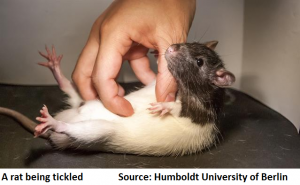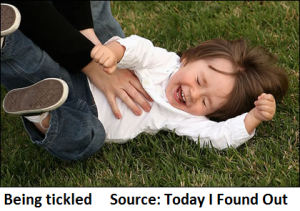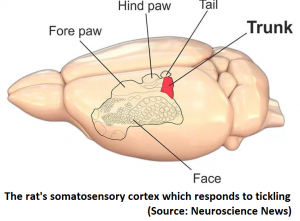Chances are, at some point in your life, you’ve been tickled on your armpits, sides, feet, and found yourself hysterically bursting into laughter and giggles. Have you ever pondered what kind of purpose ticklishness serves?
 Michael Bretch and Shimpei Ishiyama at Bernstein Center for Computational Neuroscience in Berlin published a paper last week investigating a rat brain’s response to tickling and provided us with an insight as to why ticklishness evolved.
Michael Bretch and Shimpei Ishiyama at Bernstein Center for Computational Neuroscience in Berlin published a paper last week investigating a rat brain’s response to tickling and provided us with an insight as to why ticklishness evolved.
When the researchers tickled the rat, it not only responded with ultrasonic (or sound waves with a frequency too high for human ears to hear) vocalization that is equivalent to laughter, but it also chased after the researcher’s hand for more tickling! The rat also jumped in joy after getting tickled, a response known as Freudensprünge, which is a joyful leaping behaviour observed in many mammalian species. However, near the end of the following video edited by ScienceNews shows that the rat enjoys being tickled only when it is in a good mood just like humans:
![]()
While the rat enjoyed the tickling, the researchers examined its brain. A large area of the brain called somatosensory cortex, which responds to touch sensations, was highly active when the rat was being tickled. When the researchers just electrically stimulated its somatosensory cortex, the rat responded with ultrasonic vocalizations, or the laughter, as if it had been tickled. Interestingly, this region of the brain was also responsive during a rat’s play behaviours!
What is intriguing is that response to tickling is similar between humans and rats. They even share some areas susceptible to tickling such as soles of feet! Dr. Brecht explains that such similarity takes us back through evolutionary history to the common ancestor of humans and rats that likely used tickling as a way to build social bonds.
The link between pleasure and tickling, which activates the same area playing does, taken together with the fact that you can’t tickle yourself leads Dr. Bretch to infer that perhaps “ticklishness is a trick of the brain to make animals or humans play or interact in a fun way.”


